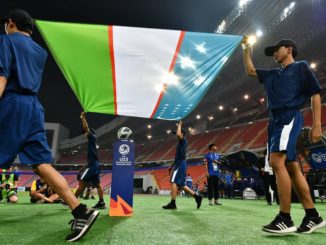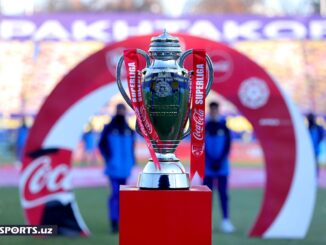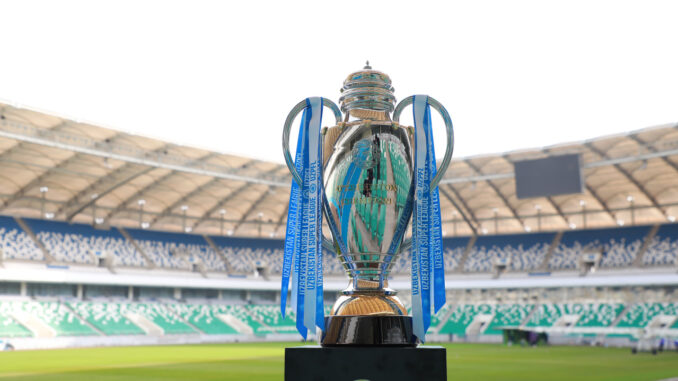
The 2024 Uzbek Super League season is set to get underway this weekend, with a contrasting mix of financial prudence and a thriving youth talent pool, that raises the very real prospect of the most tightly fought title race in years.
The potential of Uzbek football as a developing talent factory is far from a secret nowadays. The presence of their U20s on the world stage at last year’s FIFA U20 World Cup brought with it an international realisation of football in the country
Following the emergence of individual talents such as Eldor Shomurodov, Abbosbek Fayzullaev and Abdokhodir Khusanov, now regularly impressing in European club football, Uzbekistan has very much entered the stage on the world footballing map.
Rationalising that output with what happens in the domestic game isn’t always the direct lineage some such as Graham Arnold may equate, however. The Socceroos’ head coach was highly commendable of the youth development taking place in the country at last month’s AFC Asian Cup, putting high praise in particular on the league structure that sits behind it.
While the domestic league has made improvements over the last five years, it’s far from the ideal environment many would hope it to be. Infrastructure remains patchy, attendances remain low outside a handful of clubs, while allegations of boardroom corruption and interference remain an all too regular feature.
Ahead of this season, this all plays out in a financial landscape where Uzbek clubs are doing well simply to stay afloat.
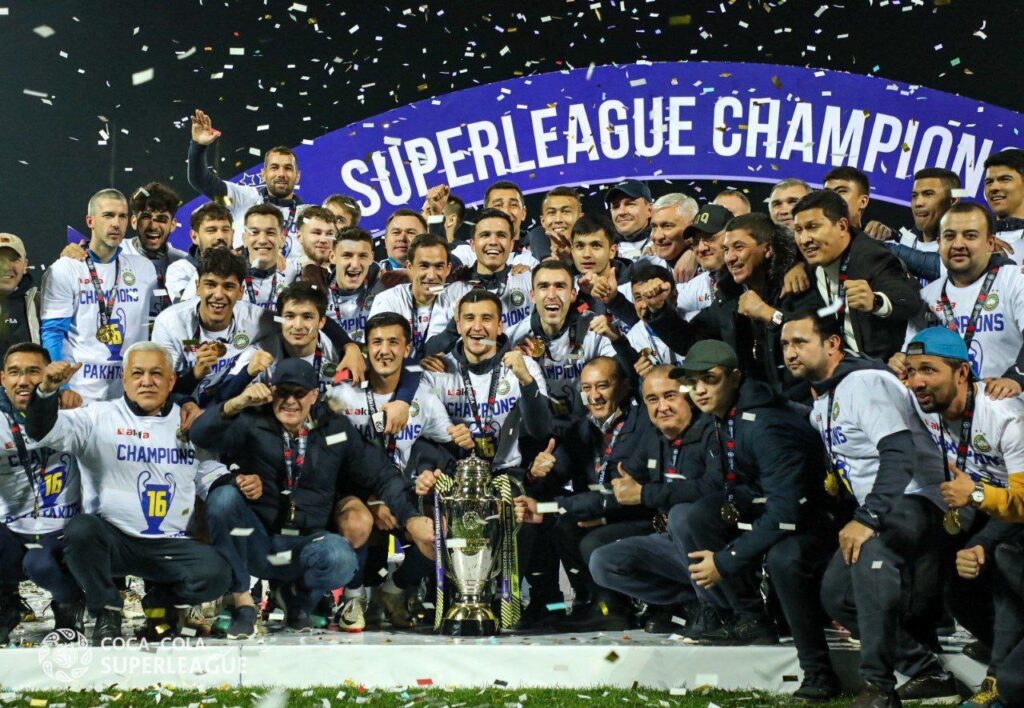
The drive for clubs to privatise and stay in the black rumbles on as a distraction that hangs over the new season’s kick off this weekend; transfer registrations were held off until clubs proved they were debt free in the build-up, while some, like national giants Pakhtakor, have been forced to make widespread cutbacks on personnel and off the field investments.
While the fragile circumstances that surround it may cast doubt over the coming season, it conversely sets up one of the most even title chases we’ve seen in years.
From old to new, Pakhtakor’s sudden evolution
The record 16-time Uzbek championship winners, who won their fifth title in a row back in November, have slowly been retreating over time, despite their dominance on paper.
Five years ago, under former coach Shota Arveladze, Pakhtakor were untouchable, built on strong foundations of senior national team experience, with an attacking setup that could compete against anyone at home and abroad. This winter, however, they have all but parted ways from their imperious stature. In its place an untested and fresh squad that remarkably transitions from one of the oldest last year, to the second youngest in the league this.
The bulk of last season’s title winning squad have now moved on. Azizbek Tugunboev earnt a move to Turkey following his performances at the Asian Cup, Khojimot Erkinov opted to move to the UAE, while Farrukh Sayfiev and Odil Hamrobekov snuck out to title rivals Navbahor.
While Pakhtakor have been far from their dominant selves even in the last couple of seasons; what they have demonstrated under coach Maksim Shatskikh is an unerring ability to grind out results in an ugly fashion.
While others around them stole the headlines and brief limelight, blowing hot and cold on a weekly basis, Pakhtakor were regularly able to scrape out wins from almost nothing; harnessing the vast experience and technical quality they undoubtedly held over their rivals.
This year, however, in place of the often cliched sign of champions, they have to start again fresh. Failure to draw in sufficient revenue over the last few years, and a less than satisfactory attempt at floating their privatised shares, the club, who continue to lack the sort of fan engagement their peers regularly attract, have turned to their youth academy to salvage the side ahead of the new campaign.
Once the pride of Uzbekistan, Pakhtakor’s youth set up is now a remarkably equal comparison to many clubs across the country who have stood up and invested significant attention in building a sustainable development line.
Uzbekistan’s youth development drive, keenly observed and now being replicated across parts of Asia has been a remarkable about-turn, for a domestic game that had been stuck in its ways for a decade or more.
Symbolically, ahead of next month’s U23 Asian Cup, which will double as this summer’s Olympic games qualifiers, Uzbek domestic football will take a month off to facilitate and promote engagement with the tournament. Very few if any established league across the world would afford so much priority on an international youth tournament, let alone need to, given the prominence those involved have on the domestic league.
While others have embraced this shift in focus, ironically Pakhtakor, as the dominant force for the last decade, have failed to take the lead in this regard. A decision, that will no doubt be assessed in the coming year.
In individual young talent such as Diyor Kholmatov, Diyorbek Ortikboev and Donyor Abdumannopov, Pakhtakor look to possess some real potential, but it’ll come at a cost as they take a while to bed in to an established and admittedly rudimentary system. A winless pre-season spell that concluded with a comfortable defeat to second tier side Kokand last week hasn’t exactly raised title retention spirits.
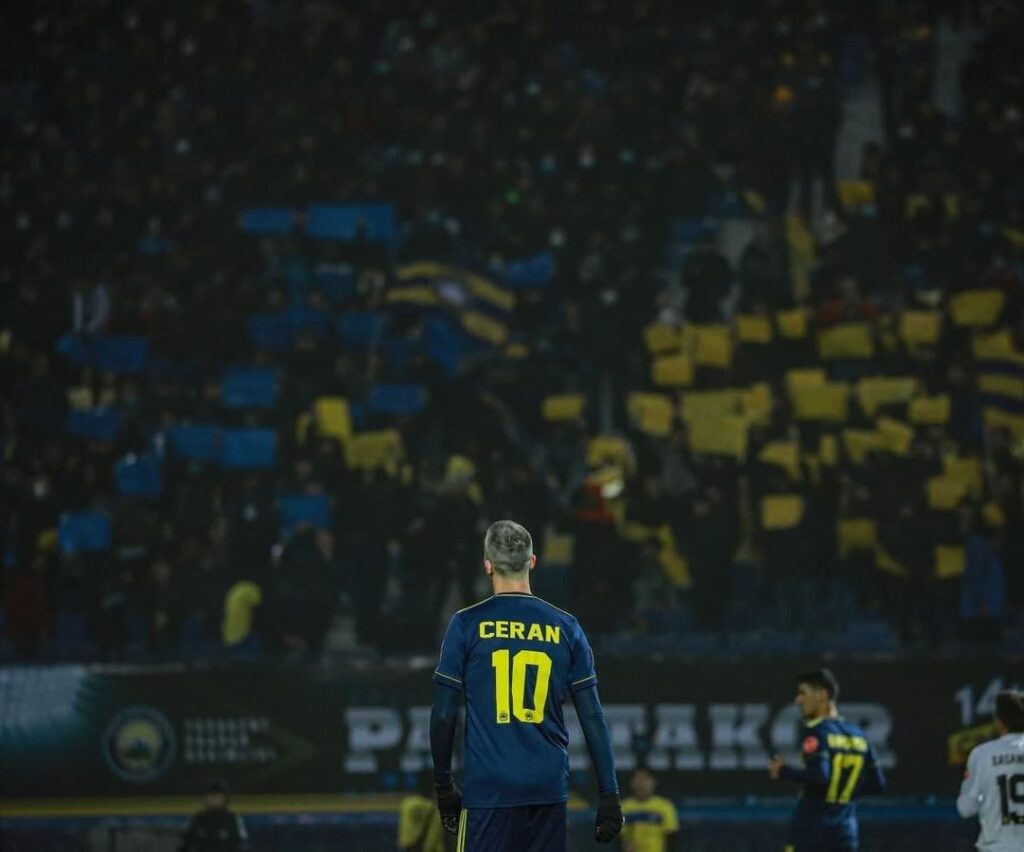
The saving grace is the consistent form of the eternally young Dragan Ceran. The giant Serb, now 36, once again topped the Uzbek scoring charts, for a fifth consecutive season – but even he had to limit his minutes last year – and that’s when Shatskikh had options to pull on.
While it’s been predicted for some time, this season looks set to be the best chance for their rivals to seize the opportunity in knocking the Cotton Pickers off their perch.
Challengers out to topple a dynasty
As I have been hinting at for the last few seasons, Pakhtakor’s fragility has slowly opened up opportunities for others to take advantage of.
Despite having seen an upturn in success on the continent, namely a second successive appearance for Nasaf Qarshi, and a first success for Navbahor Namangan in the knockout stages of the AFC Champions League, neither have been able to break the Tashkent giants’ strangle hold domestically.
The two teams represent distinct challenges for Pakhtakor’s crown; Nasaf an unassuming team, built on youth development with a clear philosophy of play, and Navbahor, the passionately supported outsiders, assembled around star individuals and an enigmatic coach.
Neither approach proved enough last season, with Nasaf all-too-often lacking in front of goal, and Navbahor in ability to unite a team and the nerve to come alive in crucial moments.
Nasaf have sought to address their key goalscoring concern by securing the stand-out purchase of the winter break. Bobur Abdikholikov’s return from a mixed spell in Kazakhstan is well heralded, and given his critics tend to focus on his overall play outside the box rather than his finishing – the theory goes if he’s given opportunities, he has the potential to take up the mantle of this season’s golden boot winner.
Navbahor, however, have seemingly opted to merely rehash their practices of old by recycling through yet more big names.
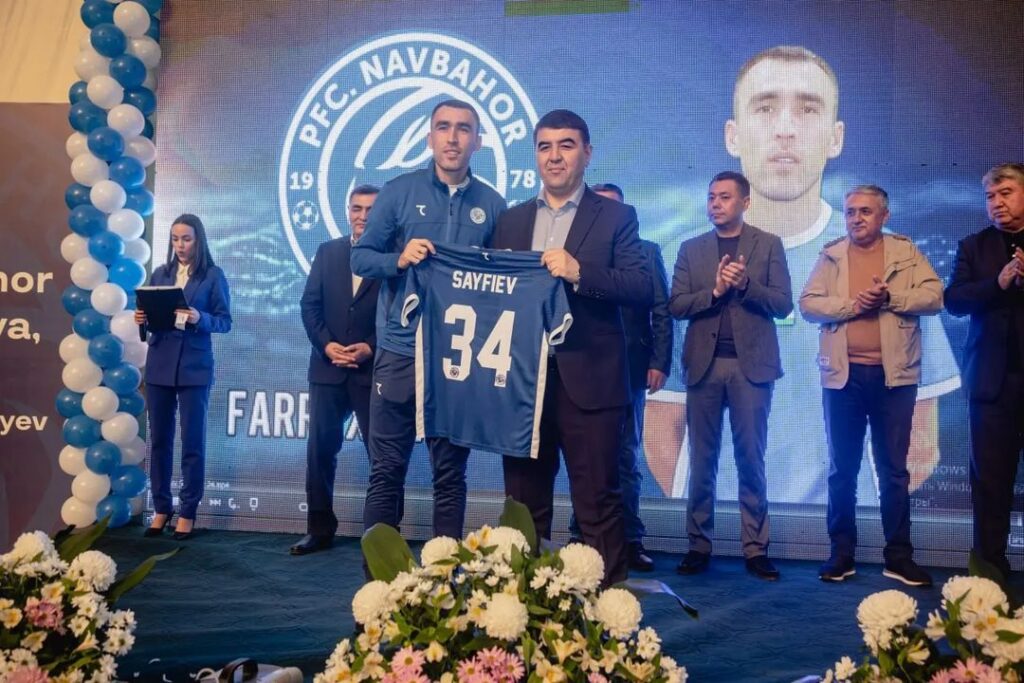
Out goes Oston Uronov to Persepolis and Jasur Yakshiboev to Ordabasy in Kazakhstan, whilst bringing in Georgian striker Giorgi Nikabadze alongside Farrukh Sayfiev and Odizhon Hamrobekov from Pakhtakor. Despite their recognisable names, the latter two differ in their proven track record for success, seeking to add a level of experience often labelled as Navbahor’s Achilles heel.
While Nasaf and Navbahor signify the obvious title challengers, the momentum in the last six month instead lies in the form of Neftchi Fergana.
A former great, not only of Uzbek football in the early and mid-90’s, but also back in the Soviet days, Neftchi declined into obscurity following relegation to the second tier in 2018, but recently have finally seen a renaissance since their return to the top-flight in 2022.
Under Tajik coach Vitaliy Levchenko, Neftchi were the surprise package of last season, holding their own at the top of the league standings for much of the season, failing to lose a match until mid-October, before losing tabs on those ahead of them in the closing stages.
Neftchi may have finished fifth in the end last season, but they only trailed the top two by three points – ultimately let down by a lack of creativity in the final third that contributed to no less than a third of their matches ending all square.
They have been one of the few truly active squads in the off-season transfer window however – bringing in Tajik international Manuchekhr Saforov – who played under Levchenko at Istiklol, and Sanzhar Kodirkulov from newly promoted Lokomotiv, dynamic winger Javokhir Kakhramonov from Sogdiana, and giant Nigerian striker Nsungusi Effiong from spells in Denmark and Kazakhstan.
In addition, the double loan capture of Jasurbek Jalildoninov and Khysayin Norchaev, very much the Shomurodov and Masharipov of the Uzbek’s current Olympic hopes, could provide the most intrigue and expectation.
Norchaev’s temporary return, having struggled to find consistent form in Russia, is timely, as the senior national team look to consider a Plan B if they were ever to be without Eldor Shomurodov again, following the striker’s injury absence at the Asian Cup.
In national team colours, Norchaev’s relationship with Jalildoninov fired Uzbekistan to the U23 Asian Cup final two years ago, Neftchi will be hoping they have the same impact domestically.
The good, the bad and the financially crippled
In general terms, the base of Uzbek domestic football continues to improve. The potential to unearth a young talent for the future, or to acquire an unexpected overnight sensation from abroad, once saved for the top sides in Uzbekistan, now seems to be spread evenly across the league.
The best in this respect last season was Andijan, the serial yo-yo team of Uzbekistan, who orchestrated a breakout season last term, mainly thanks to the goals of eventual USL player of the season Rubin Hebaj.
While the flash in a pan success of their Albanian striker ultimately saw him take flight for the glamour of Saudi Arabia, the recruitment of imposing Tajik striker Shahrom Samiev, former Pakhtakor youngster Rustam Turdimurodov and 18-year-old Russian prodigy Luka Zgurskiy from CSKA Moscow, spreads the opportunity of lightning striking twice in a row.
The success of Olympic FC, the federation managed youth national team, who’s name points to its ultimate priorities, will likely take a step back this term from being a constant thorn in the top of the table’s side, as they now look towards generation-2028, and a new cycle of youth development.
Sporting success has always been an added bonus for the side who have progressed the careers of so many young players already, either plying their trade in Europe, or in the top four at home over the last few years – yet it’ll be a close run thing if Timur Kapadze can recreate a similar success with a new generation whilst avoiding a relegation fight this year, either side of his second managerial role in directing Uzbekistan’s Paris 2024 hopes.
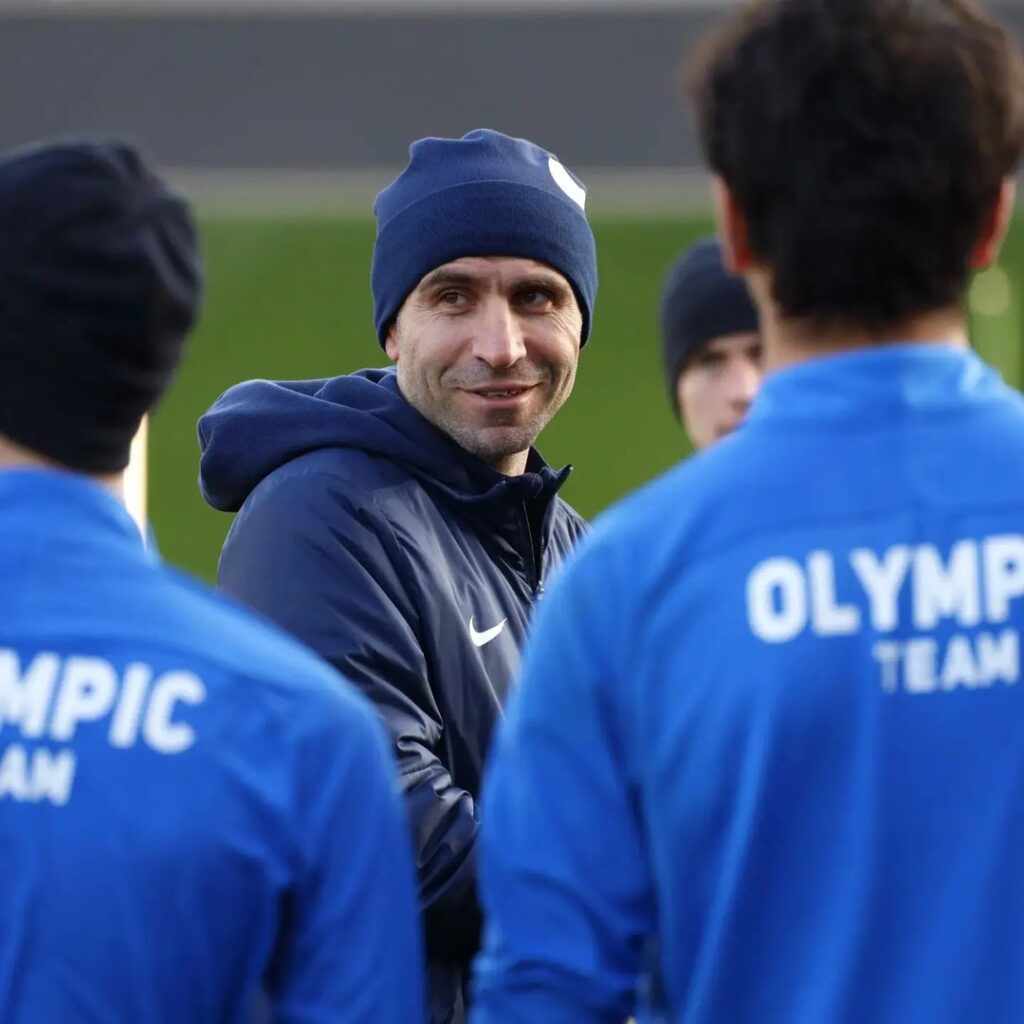
The possible disrupters, then, could come in the form of newly promoted duo Lokomotiv Tashkent and Dinamo Samarkand. The former, the last domestic champions before capital city rivals Pakhtakor back in 2018, may have lost a few of their key contributors that brought them the Uzbek Pro League title last year, but they still offer enough to stay afloat.
Dinamo, on the other hand, have been able to significantly bolster their roster.
Former national team coach Vadim Abramov, who has been able (for now) to keep hold of Kyrgyz international striker, Joel Kojo, following his eye-catching displays in Qatar last month, has added last season’s Pro League golden boot winner Anavt Khozhimirzaev, and Emmanuel Yaghir, who like Kojo, is a Ghanian born striker who’s found his feet in Central Asia during his time in Kyrgyzstan, to an eye-catching strike force.
Given the coach’s attacking philosophy, they could be this season’s early wildcard from the outset.
Hopes for others seem more distant – a symptom of financial cutbacks, and a broad reshuffling of personnel amongst one another.
Last week’s news that former big spenders Bunyodkor will have to pay former stars Rivaldo and Denilson over €10m, would be difficult for any Uzbek side to meet in good times, let alone when the club and the league as a whole are tightening the belt already.
While prudence limits off-the-field action for some; the scale of youth talent developing across the league offers optimism for the season ahead. A season that promises competitiveness, unpredictability and excitement. When was the last time we were afforded such a tantilising campaign?



